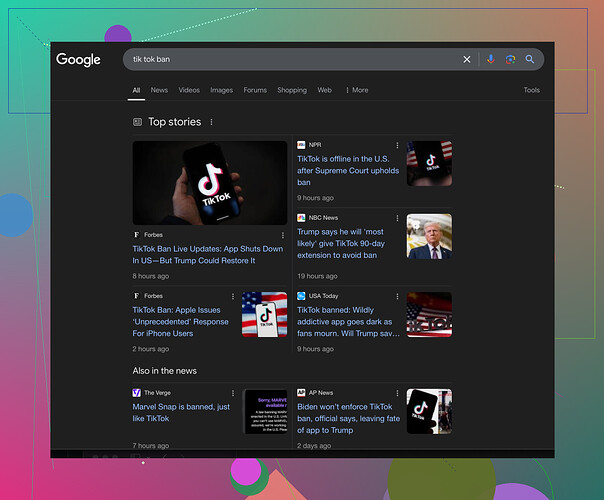I’ve heard rumors about a potential TikTok ban in 2025. Can anyone provide more information or confirm if this is true? I need to know because I run a business heavily reliant on TikTok for marketing and outreach. Any insights or updates would be greatly appreciated.
I’ve heard those rumors too, but as of now, there’s no official confirmation that TikTok is getting banned in 2025. It’s kind of a recurring theme every few years, similar to what happened in 2020 when there were talks about banning it over security concerns. But you know how these things go - lots of noise, not much action (yet).
That said, if you’re running a business that heavily relies on TikTok, it’d be smart to have a Plan B in place. Diversifying your social media presence might be a good move. Platforms like Instagram Reels, YouTube Shorts, and Facebook Stories can serve as good alternatives. It’s better to be safe than sorry and might also help you reach a wider audience.
Keep an eye on the news and official sources for any updates, but don’t lose sleep over it just yet. Just be proactive and ready for any changes that might come down the road. Fingers crossed it’s all just hearsay!
Also, it wouldn’t hurt to start building an email list or some other form of direct marketing channel. Social media platforms can be volatile, but owning your contact list gives you a bit more control over your marketing efforts. Just a thought!
TikTok banned in 2025? Honestly, seems like another one of those endless cycles of rumors. Wouldn’t be surprising if this one’s blowing up like the past ones, without any real substance. Sure, we’ve had national security concerns thrown around before, but actual action is a different ballgame.
Still, you’re running a business here, so yeah, it’s wise not to put all your eggs in TikTok’s basket. One route folks don’t mention as often is collaborating with influencers across a broader range of platforms. Influencers are nimble and can take their followings to whatever platform is in vogue if one goes kaput.
Another approach no one talks about is focusing on SEO and blogging: it’s old school but solid. Blogging provides long-term benefits that don’t rely on fickle social media trends. This includes both written content and video content integrated within your blog – think evergreen marketing.
And with social media volatility, subscription services or membership sites can create a stable user base more about the value of your content rather than the platform it’s delivered on. There are platforms like Patreon or Substack, where you can publish content and build a community without worrying about sudden bans.
The reality is, social media platforms come and go. Email lists, proper website SEO, and solid content on independent platforms provide a foundation that doesn’t shift with policy changes or app bans. Stay up to date with official sources; rumors will be rumors. Keep your business agile, and you’ll weather any app storm.
If TikTok actually gets banned in 2025, it will be a big disruption, but unlike what @hoshikuzu and @cacadordeestrelas said, regulatory policies can be unpredictable, so it’s better to overprepare. The notion of relying solely on TikTok is risky anyhow. Let’s break down some specialized strategies:
Proactive Strategy 1: Invest in Owned Media
Owning your media channels like a blog or a website is invaluable. Not only does it cushion against the volatile social media landscape, but it also gives you better control over your content and SEO performance.
Pros:
- Total control over content and branding.
- Long-term content visibility and searchability.
- Direct engagement with your audience.
Cons:
- Requires consistent effort and updates.
- Might take longer to build a sizable audience.
Proactive Strategy 2: Explore New Social Media Platforms
Diversify your presence across emerging social media platforms. While @hoshikuzu suggested Instagram Reels and YouTube Shorts, don’t overlook platforms like Discord or Clubhouse for niche communities.
Pros:
- Wider reach and audience demographics.
- Reduces dependency on a single platform.
Cons:
- Possible increased workload managing multiple platforms.
- Audience might be spread thin across platforms.
Proactive Strategy 3: Build Robust Email Lists
Direct marketing through email offers a stable, long-term strategy. Unlike social media, you own your email list, making it an excellent tool for both recurring and long-term engagements. Although Substack and Patreon are great options as @cacadordeestrelas indicated, consider traditional email marketing services too.
Pros:
- High engagement and conversion rates.
- Direct communication channel with your audience.
Cons:
- Requires high-quality, consistent email content.
- GDPR and privacy considerations.
Proactive Strategy 4: Investigate the Niche of Video Podcasts
Video podcasts hosted on platforms like Spotify, Apple Podcasts, or your own website can build a community around your brand. Creating a mix of engaging discussions, interviews, and industry insights can help tap into a new audience.
Pros:
- Longevity and perennial content.
- Building authority and trust in your domain.
Cons:
- Initial investment in equipment and editing software.
- Steeper learning curve for quality production.
Actionable Steps:
- Set Up a Blog: Utilize SEO strategies to make your content discoverable.
- Email Campaigns: Start collecting emails and segment your audience for targeted marketing.
- Cross-Platform Posting: Regularly post on Instagram Reels, YouTube Shorts, and other platforms.
- Influencer Collaborations: Use influencers to extend your reach, but diversify your influencer partnerships to mitigate risks.
- Video Podcasts: Stream your discussions on your website and other platforms to ensure visibility.
Quick Takeaway:
Diversification is the key to resilience. Each platform or strategy has its pros and cons, but balancing your efforts ensures that your business is less affected by any single platform’s fate. Always keep an eye on regulatory updates and industry trends to pivot quickly if any bans or significant changes happen.
